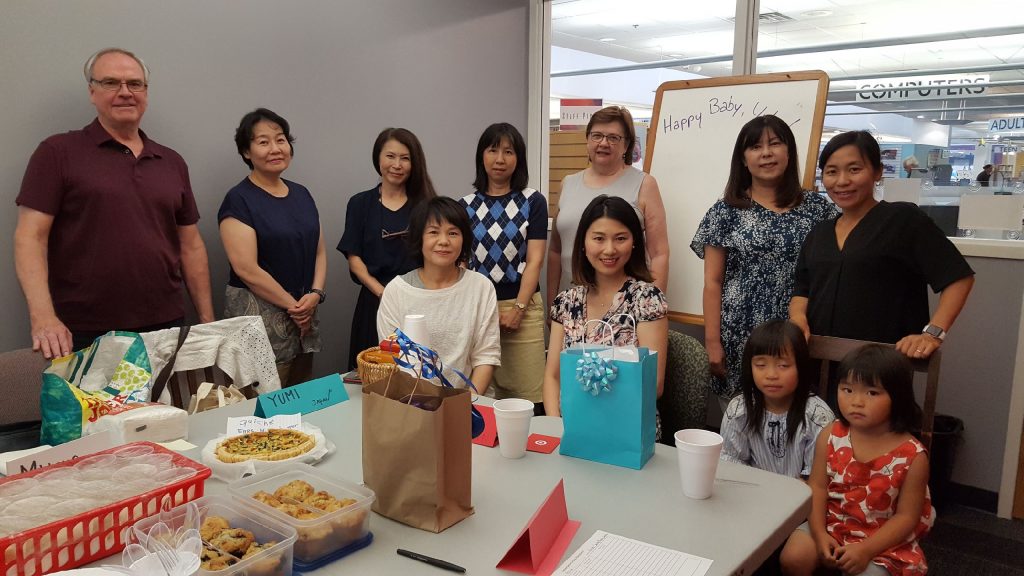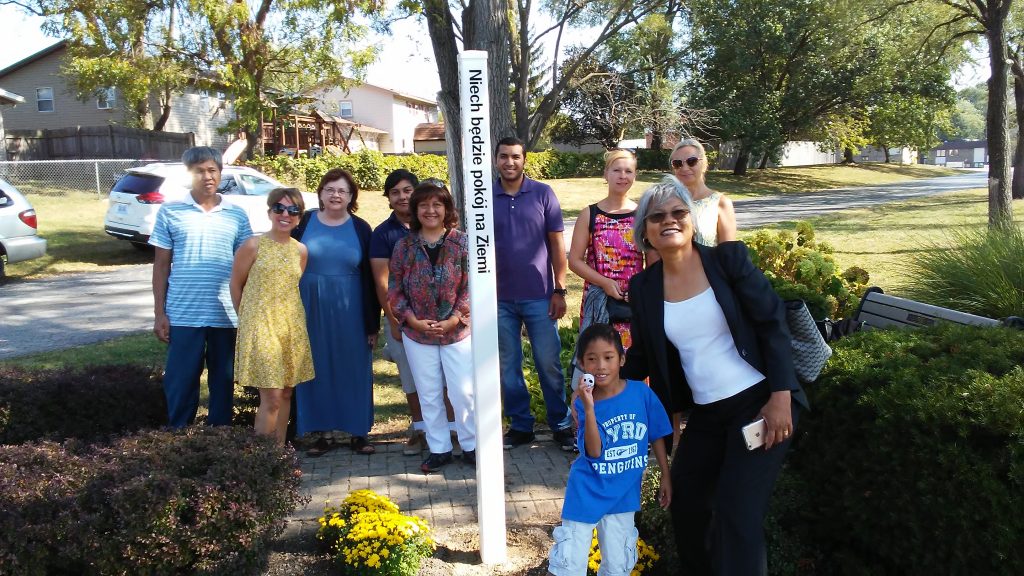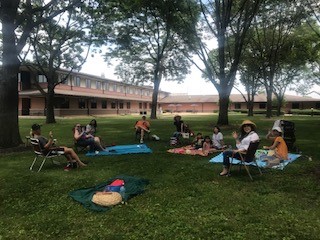Conversation groups are special, often becoming more than just a group.
At Literacy DuPage, our ESL conversation groups are intended to give intermediate and above adult learners from around the world, practice speaking English in a relaxed, comfortable atmosphere. In 2019, there were 1,023 attendances by learners at one of Literacy DuPage’s drop-in conversation groups! Many of these learners began attending the group alone and without a confident and robust English-speaking foundation. There is no charge to participate in a conversation group, and we do not require a commitment or registration.
Often conversation groups become more than a place to practice English. Some groups become an enjoyable social club, where neighbors and friends are invited to join. Many friendships have developed from the groups, and support is always shown for new group members.
The Itasca Library conversation group has a SPARK all on its own.

The group celebrating Yukie’s baby shower
The conversation group that meets at the Itasca Public Library is steadily 8-10 individuals strong and comprises mostly Japanese women whose husbands are here for business. When the conversation group leaders started allowing well-behaved children to attend with their mothers, the group morphed into a lifeline for its members.
Before COVID-19, along with meeting at the library, the group would do more than practice conversational English skills. For example, they have baked muffins in the library kitchen and have played a listening skill game where small teams verbally directed the group participants to various locations in the library.
They have also taken several road trips to enjoy food and fellowship. They have visited Thai and Indian restaurants, and an American diner (which I learned from talking with Group Leader Marlea the tuna fish sandwich was a surprise food item!). They even participated in a “peace pole garden” dedication. The group became so close that with the onset of COVID-19, there was never a question about whether they would meet or not.
Not fazed by COVID-19.

The group at the dedication of a peace garden
Prior to the pandemic, the group had participated in enough outings that it was crucial to be able to confirm or remind participants of upcoming events. Therefore, conversation group leaders had participants’ phone numbers, emails, or other means of contact before shelter in place was even discussed. Once the pandemic hit, Group Leader Marlea realized the group could easily meet on Zoom like the library had started doing with its programs. The three Group Leaders, Marlea, Randy, and Karen, jumped on it and got everyone (including the library) on board. The library provided the Zoom platform to the group and since then, a variety of library staff members have been extremely helpful in making sure the group has what it needs regardless of which direction they go. Marlea is in almost daily contact with one staff member or another.
Recently the group met in person, the first time since March! They met for their first-ever picnic. The group suspects this will be the first of many picnic meetings. While incorporating safe social distancing practices, the group talked, laughed, and caught up. The group plans to meet as before, once it is safe to do so. But for now, Zoom and a get together here, and there will do the trick.
“These women have formed a support group and brought others in. They strongly desire to maintain this contact. There have been several instances where, because our connections existed, we have helped navigate court hearings, doctor/dentist appointments, school registrations, travel logistics, children’s entertainment, etc. Whether Zoom or physical meetings, this group is here to stay. ”
– Group Leader Marlea
Not every conversation group has the same circumstances as the Itasca group.

Group picnic get-together
When asked about why this group has been so successful during this challenging time, leader Marlea acknowledged that the group is surviving because it is unique to Literacy DuPage. The membership is self-perpetuating because the library has provided resources that have addressed a very specific need that has not otherwise been recognized. Without the heartfelt need exhibited by these women, Marlea doubts the group would have been able to transition from real to virtual meetings so successfully.
Whatever the reason for the ability to continue meeting, the group’s commitment (library, leaders, participants) is inspiring! We are moved by their story and are excited to see what the group does next!







